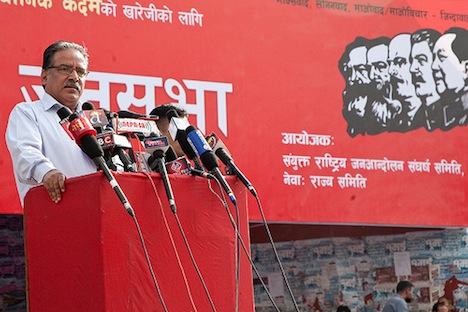Nepal, a Hindu Himalayan state of nearly 27 million people isn’t generally on the radar screens of international policymakers. ![]()
But it should be — the country is nestled between the world’s two most populous countries (and increasingly, economic powers), China and India.
Over the course of the last week, it’s become increasingly clear that the once-dominant Unified Communist Party of Nepal (Maoist) (UCPN-M, एकीकृत नेपाल कम्युनिष्ट पार्टी (माओवादी)) suffered a huge setback in the November 19 elections to the constituent assembly, leaving a once revolutionary rebel group smarting and alleging fraud in the initial shock of defeat, despite no real evidence of electoral malfeasance.
By way of background, Nepal’s elections followed a very rough transition from over two centuries of monarchy to an imperfect democracy. Despite reforms over the monarchies of King Mahendra and King Birendra in the last half of the 20th century, democratic reformers continually pushed for larger openings. Nepal’s precarious situation took a turn for the worst in 1996, when the UPCN-M launched a war against the monarchy for the purpose of abolishing it and replacing it with a people’s republic, under the leadership of Pushpa Kamal Dahal (pictured above), commonly known as ‘Prachanda.’ The massacre of the entire royal family in 2001 and the subsequent failure of Gyanendra, Birendra’s brother and his successor, to stabilize Nepal, led to the end of the monarchy in 2008.
It also led to a set of elections in April 2008 for a constituent assembly, a 601-member body of representatives designed as a temporary government that would write a new constitution and govern for two years. The UCPN-M won those elections, and Prachanda became prime minister.
But within months, Prachanda resigned over a conflict with Nepal’s president over the firing of Nepal’s military chief, leading to a series of four prime ministers over the next four years, months-long stretches without a government and increasing dysfunction. Five years later, Nepal has no new constitution and after multiple delays, last month’s elections (originally scheduled for November 2012) were designed to elect a constituent assembly with a renewed mission. Continue reading Nepalese Maoists election loss means centrist parties likely to agree new constitution
